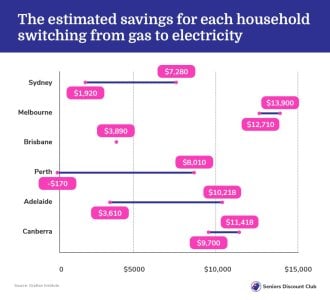Save money & protect the planet: How switching to an all-electric home can benefit you
- Replies 37
Are you seeking a solution to lower your cost of living while also contributing to protecting the planet? If so, it's worth considering transitioning to an all-electric home.
In this article, we will explore the concept of all-electric homes and the advantages they offer regarding our finances and the environment, based on a recent report by ABC. Get ready as we delve into the economic and environmental benefits and the role governments can play in facilitating this transition.
Did you know that if all Australian households, currently dependent on gas, were to switch to an all-electric system today, we could save over 30 million tonnes of carbon dioxide emissions in the next ten years? That's a remarkable reduction!
But it doesn't end there—this transition also brings lower energy costs. Electric appliances can accomplish the same tasks as their gas counterparts while consuming less energy, resulting in long-term savings.

The ABC report highlights the environmental and financial benefits of transitioning away from gas in homes. With many Australian households struggling to pay rising energy bills, the potential to save money while making a positive environmental impact has never been more enticing.
However, going all-electric may seem daunting and inaccessible for many households. That's where government assistance comes into play, as they can help remove various hurdles to all-electric homes and bring emissions-reduction targets closer to reality.
For instance, Melbourne residents may consume significantly more gas compared to other regions due to cold winters. Still, the report found that those switching to electric appliances (or moving to an all-electric home) could save up to $13,900 over a decade. Households with rooftop solar will further increase these savings.
Nevertheless, various obstacles remain for households to make the switch, such as a lack of control for renters over appliance choice, added complexities in apartment living like the bundling of gas bills into body-corporate fees, space constraints for centralised electric heat pumps, upfront costs, and individuals who simply prefer cooking with gas.
To facilitate the transition towards healthier, all-electric homes, the report suggests several government initiatives, such as:
A crucial part of these initiatives involves communicating the benefits of electric appliances to the public. For example, the Ginninderry all-electric suburb of Canberra saw the percentage of potential homebuyers willing to consider an all-electric home increase from 67% to 88% after featuring cooking demonstrations on induction cooktops in the display village.
While the gas industry is keen on promoting 'green gas' solutions like biomethane or 'green' hydrogen, these options are far more expensive and have yet to be widely available.
Currently, more than three million Australian homes run exclusively on electricity. Encouraging the remaining 5 million homes to switch, backed by supportive government policies, can substantially improve household finances and the global environment.

Based on the ABC report, transitioning to an all-electric home could be a viable and beneficial choice for numerous Australians. Now, members, we want to hear your perspective on this matter. Have you contemplated the idea of shifting from gas-powered to electric appliances? Please share your opinions and thoughts with us in the comments section below!
In this article, we will explore the concept of all-electric homes and the advantages they offer regarding our finances and the environment, based on a recent report by ABC. Get ready as we delve into the economic and environmental benefits and the role governments can play in facilitating this transition.
Did you know that if all Australian households, currently dependent on gas, were to switch to an all-electric system today, we could save over 30 million tonnes of carbon dioxide emissions in the next ten years? That's a remarkable reduction!
But it doesn't end there—this transition also brings lower energy costs. Electric appliances can accomplish the same tasks as their gas counterparts while consuming less energy, resulting in long-term savings.

Electric appliances use less energy than gas appliances to do the same job, making them cheaper to run. Credit: Shutterstock.
The ABC report highlights the environmental and financial benefits of transitioning away from gas in homes. With many Australian households struggling to pay rising energy bills, the potential to save money while making a positive environmental impact has never been more enticing.
However, going all-electric may seem daunting and inaccessible for many households. That's where government assistance comes into play, as they can help remove various hurdles to all-electric homes and bring emissions-reduction targets closer to reality.
For instance, Melbourne residents may consume significantly more gas compared to other regions due to cold winters. Still, the report found that those switching to electric appliances (or moving to an all-electric home) could save up to $13,900 over a decade. Households with rooftop solar will further increase these savings.
Nevertheless, various obstacles remain for households to make the switch, such as a lack of control for renters over appliance choice, added complexities in apartment living like the bundling of gas bills into body-corporate fees, space constraints for centralised electric heat pumps, upfront costs, and individuals who simply prefer cooking with gas.
To facilitate the transition towards healthier, all-electric homes, the report suggests several government initiatives, such as:
- banning new gas connections to homes,
- providing tax write-offs for landlords on electric appliance investments,
- gradually requiring every rental property to be all-electric,
- and upgrading public housing to all-electric systems.
A crucial part of these initiatives involves communicating the benefits of electric appliances to the public. For example, the Ginninderry all-electric suburb of Canberra saw the percentage of potential homebuyers willing to consider an all-electric home increase from 67% to 88% after featuring cooking demonstrations on induction cooktops in the display village.
While the gas industry is keen on promoting 'green gas' solutions like biomethane or 'green' hydrogen, these options are far more expensive and have yet to be widely available.
Currently, more than three million Australian homes run exclusively on electricity. Encouraging the remaining 5 million homes to switch, backed by supportive government policies, can substantially improve household finances and the global environment.
Key Takeaways
- Switching from gas to electricity can save Australian households money on energy bills and reduce carbon emissions by 30 million tonnes over the next ten years.
- Renters and those in apartment living situations often face hurdles when trying to convert to all-electric homes, such as control over appliances, cost, and space constraints.
- State governments can take action by banning new gas connections, providing tax incentives for landlords to upgrade properties to all-electric, and boosting public and community housing.
- The gas industry's suggestion of using 'green gas' is currently too expensive and not widely available, making all-electric homes a more viable solution for both cost and environmental benefits.
Based on the ABC report, transitioning to an all-electric home could be a viable and beneficial choice for numerous Australians. Now, members, we want to hear your perspective on this matter. Have you contemplated the idea of shifting from gas-powered to electric appliances? Please share your opinions and thoughts with us in the comments section below!








